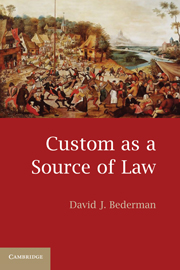7 - Contracts
Published online by Cambridge University Press: 05 June 2012
Summary
Exchanges of promises – the essence of contract – often occur in a group context. When they do, should the mutual expectations of the contracting parties, especially as conditioned by the business practices of the relevant commercial community, have a bearing on the legal enforcement of their contractual rights and obligations? Hitherto in this discussion of custom’s contemporary relevance, the community aspect of custom has been tied (at least implicitly) to place, whether for purposes of establishing family relationships or property claims. But a sense of community can be fashioned also by shared interests: a common profession, business, craft, or trade. Traced to antiquity’s collegia opificum and medieval guilds, customary practices have always been a singular feature of commercial communities.
Today in sophisticated legal cultures (particularly Anglo-American jurisdictions), unofficial business norms can be enforced legally as trade customs and usages in two ostensibly different fashions. The first is through the common law of merchant custom, very distinct in scope and effect from the English doctrine of local custom affecting property servitudes. Merchant custom was introduced in Chapter 3 (in the context of the evolution of English common law) and elaborated upon in Chapter 4 (as an economic phenomenon), but here the objective is to elucidate the legal elements for the proof, application, and enforcement of customary norms in commercial situations. Common-law merchant custom remains a robust form of interstitial norm-making for a variety of business communities.
- Type
- Chapter
- Information
- Custom as a Source of Law , pp. 80 - 90Publisher: Cambridge University PressPrint publication year: 2010



